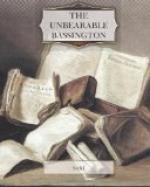“I forget her name,” said his neighbour; “she writes. She’s the author of that book, ‘The Woman who wished it was Wednesday,’ you know. It used to be the convention that women writers should be plain and dowdy; now we have gone to the other extreme and build them on extravagantly decorative lines.”
A buzz of recognition came from the front rows of the pit, together with a craning of necks on the part of those in less favoured seats. It heralded the arrival of Sherard Blaw, the dramatist who had discovered himself, and who had given so ungrudgingly of his discovery to the world. Lady Caroline, who was already directing little conversational onslaughts from her box, gazed gently for a moment at the new arrival, and then turned to the silver-haired Archdeacon sitting beside her.
“They say the poor man is haunted by the fear that he will die during a general election, and that his obituary notices will be seriously curtailed by the space taken up by the election results. The curse of our party system, from his point of view, is that it takes up so much room in the press.”
The Archdeacon smiled indulgently. As a man he was so exquisitely worldly that he fully merited the name of the Heavenly Worldling bestowed on him by an admiring duchess, and withal his texture was shot with a pattern of such genuine saintliness that one felt that whoever else might hold the keys of Paradise he, at least, possessed a private latchkey to that abode.
“Is it not significant of the altered grouping of things,” he observed, “that the Church, as represented by me, sympathises with the message of Sherard Blaw, while neither the man nor his message find acceptance with unbelievers like you, Lady Caroline.”
Lady Caroline blinked her eyes. “My dear Archdeacon,” she said, “no one can be an unbeliever nowadays. The Christian Apologists have left one nothing to disbelieve.”
The Archdeacon rose with a delighted chuckle. “I must go and tell that to De la Poulett,” he said, indicating a clerical figure sitting in the third row of the stalls; “he spends his life explaining from his pulpit that the glory of Christianity consists in the fact that though it is not true it has been found necessary to invent it.”
The door of the box opened and Courtenay Youghal entered, bringing with him subtle suggestion of chaminade and an atmosphere of political tension. The Government had fallen out of the good graces of a section of its supporters, and those who were not in the know were busy predicting a serious crisis over a forthcoming division in the Committee stage of an important Bill. This was Saturday night, and unless some successful cajolery were effected between now and Monday afternoon, Ministers would be, seemingly, in danger of defeat.
“Ah, here is Youghal,” said the Archdeacon; “he will be able to tell us what is going to happen in the next forty-eight hours. I hear the Prime Minister says it is a matter of conscience, and they will stand or fall by it.”




